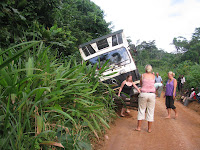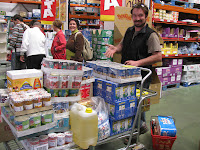After three months on the African road, I have some useful comments to pass on. Bet you never knew that --
1. Goats squat to pee -- both boys and girls, I think.
2. The colour green indicates a pharmacy/chemist shop -- usually a green cross.
3. Small medical problems quickly become big ones.
4. Mosquitos are just one of the many, many bugs that bite. In many ways they aren't the worst.
5. Fresh, good quality water is frequently available -- a big change from the 1970s. You can even buy clean water in a 500-ml bag (about 2 cups).
6. When water quality is uncertain, beer is a good, clean substitute. Wine works, too, but this is not wine territory! Way too hot.
7. Your personal thermostat changes in Africa. We think 25 degrees is cool now, and 20 degrees is freezing. Will someone please bring me my coat?
8. Even just a bit of French and Arabic can be extremely helpful in West Africa. Take classes before you go!
9. French-speaking countries in West Africa have excellent bread (and Cameroon has the best so far). Don't even ask about bread in the English-seeking ones. Blech!
10. I still really, really hate doing hand laundry and I need to do it all the time. Watch here for a laundry update which may depress you -- it will depress me!











